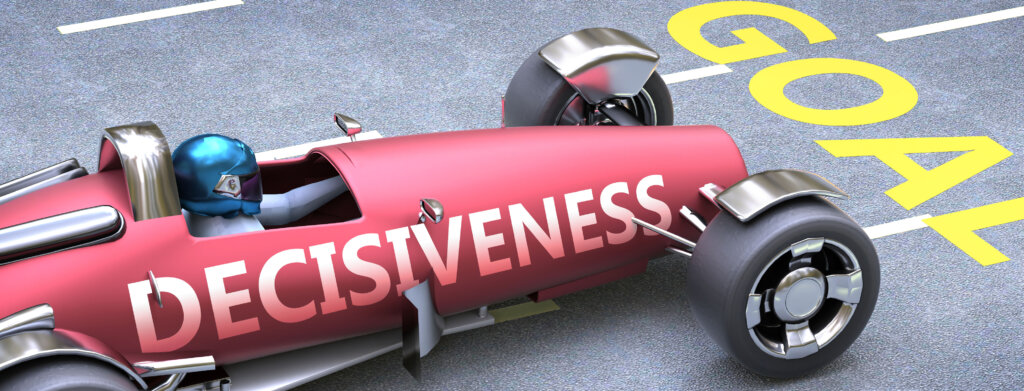Executive Podcast #240: How Can a Leader Become More Decisive?

John Maxwell teaches that one of the killers of momentum in your business is not making decisions in a timely manner. If you wait for other people or circumstances to dictate your direction, you slow momentum and put yourself and your business at risk.
Do you struggle when it comes to making timely decisions in your business?
Whether you are naturally decisive or not, leaders need to develop a decision-making process aligned with their organization’s goals and values.
Download our Learning Guide for this podcast!
Perry Holley:
Welcome to the Maxwell Leadership Executive Podcast, where our goal is to help you increase your reputation as a leader, increase your ability to influence others, and increase your ability to fully engage your team to deliver remarkable results. Hi, I’m Perry Holly, a Maxwell leadership, facilitator and coach.
Chris Goede:
And I’m Chris Goede, executive vice president with Maxwell Leadership. Welcome and thank you for joining. For those of I don’t know what’s going for those of you that have not joined us via YouTube yet, I want to encourage you to do that because we showed up today and Jake put you and I in some high chairs.
Perry Holley:
High chairs. Got a little yeah.
Chris Goede:
So we’re going to talk about today, about making decisions. And I’m not sure whose decision this was. I’m just kidding. But they were very decisive. They didn’t even ask us. They just walked in and we’re going to talk a little bit about that. Yeah, well, we’re grateful for you. As you can tell, Perry and I love getting in the room and having Jake’s help as we just go through content and content that Perry is hearing in the field. Perry just came off of a long road trip, international, serving back outside the country, serving a new client of ours. And so we’re just going to bring real stuff to you that organizations and leaders are dealing with. As we get started, I want to encourage you to go to Maxwellleadership.com/podcast. There you can download a learner’s guide that Perry’s created for the content he’s brought to us today. Or if you’re interested and you want to fill out a form just to learn a little bit more about what we deliver for organizations, why Perry was international, and some of the content that we can help you and your team with, you fill out that form, and our team would love to be in touch with you for that. Well, today’s topic, as I kind of teased it just a minute ago, that we’re going to bring to you, is how can a leader become more decisive? And John talks a lot about how not making a decision is a decision and it kills momentum for leaders. And we got to really think through that, and we can’t be waiting at all times on other people and circumstances to dictate what that decision is going to be. And so whether you are naturally decisive like Jake was in changing the studio without asking, or maybe you’re on my side and we’re going to talk a little bit about this today where I’m not as decisive as I want to be and I am more decisive than I have ever been. Again, that’s a country song. We talked about that again.
To be a Successful Leader, You Need Feedback on Your Leadership.
We’re excited to announce our new and improved Organizational Effectiveness Survey (OES). The OES gathers feedback from employees to give leaders and management the knowledge and action plans needed to develop a more effective and productive work environment. Our new version measures 4 areas of your business: Leadership, People, Strategy, and Performance.
Perry Holley:
Yes.
Chris Goede:
I don’t know why that theme is in here, but we’re going to talk a little bit about that and then how do we make decisions and make sure that they’re aligned with our organizational goals and values. Perry, thanks for bringing this content. Talk to us a little bit about what you’re thinking today.
Perry Holley:
Yeah. So it comes up on our 360 degree assessments we do with leaders as part of our coaching practice, kind of getting a view from above you, beside you, and below you. And one of the things I notice that comes up more often than not is the people calling out that the leader doesn’t make timely decisions, and decisiveness seems to be a problem. And as you said, it’s a momentum killer. If you’re waiting on situation or circumstances to change, to make, to force your decision, you’re in a bad way. And when I press on the leader and ask them about that, they tend to know this. They go, yeah, I don’t mean to delay, but I want to make sure I got all the ducks in a row. I want to make sure I have all the information possible. I want to make sure they don’t say this. What they’re really telling me is I don’t want to make a mistake. I don’t want to make a bad decision, which who does? But by delaying, it’s almost better to make a bad decision and redo it than to wait and then have things dictated to you.
Chris Goede:
Totally. Totally agree.
Perry Holley:
What’s your status on yeah, as I started, I was kind of wanting to make sure you pay the close attention.
Chris Goede:
Yeah, that’s right. Kidding. This is something that I’ve had to work on as a leader because I’m a very collaborative leader. But this is absolutely something I’ve struggled with, especially making timely decisions. And I think when what I’ve seen over my time of not making decisions in a timely manner is missed opportunities and missed momentum for the team and things that come along. And so I think there’s a pace and there’s a process to making decisions, and I think you got to get into that rhythm and that system, and we’re going to talk a little bit about that today and just give you some pointers and some hints on how to do that. But I think as leaders, this is key because it drives the momentum of our team and our organization.
Perry Holley:
Well, the two things I’ll hear is that I’m waiting for more information. So a lot of leaders, I’m finding it too much information. You’ve heard of paralysis by analysis that I’m analyzing, I’m just keep gathering, gathering, gathering. If there’s too little information, they begin to overthink it, try to make it more than it needs to be. And I guess the fear of failure, the fear of making a mistake climbs in, and then they don’t realize it’s becoming a delay. What I found interesting on the 360 is that the people around you notice this. They were waiting for something or I was on a call this morning, and the executive told me that he reports up to the sea level, and they don’t seem to want to make a decision. They keep waiting and it’s killing us in the field because we need to move. We need to move now. I’m thinking, yeah, it’s kind of the way it is. But I hadn’t really considered until the 360 that people are watching you all the time.
Chris Goede:
They’re noticing, hey, TikTok and that comes back to your leadership credibility as a leader, especially those that are in the field or closest to the customer that are needing that decision. And they’re not getting it from you as a leader or the leadership team. Man it definitely affects the credibility. And like I mentioned earlier, I think that you have to have a process in order to become better at it. Again, we’re not saying that everybody needs a process because some are without a shadow of a doubt, they’re going to shoot first and then they’re going to worry about aiming after that. They may need to slow down a little bit. But most people that I think we work with and that we have coached and experienced it’s, that how do I make that decision faster and be quicker with it and for it to be relevant and to your point, it’s very accurate. So we’re going to talk in, we’re going to dive in. I think you have five items maybe for us today that we could and he didn’t even give me a teaser. He just listed them. But I counted them right away before I even reviewed the I could have.
Perry Holley:
Said ways to be a better decision maker.
Chris Goede:
You could have, but you didn’t. And you wanted to see if I.
Perry Holley:
Was paying out this growth in my band.
Chris Goede:
So we’re going to talk about the first part. We’re talking about five parts to decision making process. And the first one is you got to be able to define the problem well, that you’re trying to make a decision or an opportunity or what is the clear definition behind what you’re trying to solve, to fix, to make a decision around a problem. And I think if you do that, you will increase your chances of making better decisions, making them on a timely manner if you have a well defined problem. And I think oftentimes we make decisions that may not even be the right decisions. And then so then we just want to stop making decisions. And it may just come back to this first point that you bring here, which is, man you got to define it first. It’s got to be a well defined problem in order for us to make decisions to solve that problem.
Perry Holley:
Yeah, well, I’ve noticed in my own life, leading both at home and at work, there’s no lack of people telling me, hey, we need to do this. And I’ll say, Tell me, what are we trying to solve? What’s the issue? And they’ll say, Well, I get a very vague definition of what’s going on and they want me just to let’s just do this. I said, well, let’s talk about the problem. And I was reminded, Einstein said that if you had an hour to solve a problem, he spent 55 minutes defining the problem and five minutes solving it. So I love the idea of don’t start solving something before you know what it is you’re solving. And I find that once I understand isn’t that interesting? 55 minutes to define the problem. Once I define it, I only need five minutes to solve, because once I know the problem, it’s a pretty quick fix from there. And so you got a couple of types of leaders that they can make a quick guess to solve it, and those that try to fully, fully understand the problem. So I’m a big fan of let’s define it, then we’ll solve it. And it usually moves a lot faster.
Chris Goede:
A lot faster. That’s good.
Maxwell Leadership Growth Plan Ad [00:08:33]:
Leaders, you know better than anyone that growth is essential if you want to make tomorrow better than today. But fitting growth into your calendar takes intentionality and self discipline. So let Maxwell Leadership help make your growth achievable. You’re invited to join thousands of worldwide leaders in using the Maxwell Leadership Growth Plan. The Maxwell Leadership Growth Plan provides you with convenient and easy to implement leadership resources, including video lessons from John Maxwell, all at your fingertips. Available in our Maxwell Leadership app or online, you’ll be coached by many well known leadership experts that will help you achieve your growth goals. You can even listen to this podcast right there in the app. Check it out for free today at growth Leadership.com. That’s growth, Leadership.com.
Chris Goede:
Well, this leads to our second part of the process, which is the ability to gather information relevant to the decision.
Perry Holley:
Should have underlined relevant.
Chris Goede:
Well, as I was going through this and looking at it, I was like, oh, I am a huge fan of gathering as much information as I possibly can. I’m an analyzer by trade. So what does that do then? That creates a little bit of, as you mentioned earlier, being paralyzed to be able to make a decision. And that’s why I emphasize the word relevant. Are we gathering information about the decision we need to make that’s relevant to the decision that we need to make, and we need to seek advice and input from trusted sources. For example, oftentimes I’ll bounce an idea off you or decision off of you and what do you think about this? And because you’re in it with me, you understand that it’s relevant. You can speak to that versus me just throwing out a question to somebody else saying, hey, what would you do if you were me? And they don’t have any context to that. So the caveat here, before I let you speak on this, is make sure you limit the options that you’re creating and thinking about in the decision that you have to make. Because I think the more options that you create for yourself, then you’re going to continue to be in a little bit of a paralysis mode. And so make sure that as you’re gathering information, it’s very relevant and you limit your options of the decision you need to make.
Perry Holley:
That’s a great point right there, because we talk about the inner circle sometimes, but other people in certain situations, a decision you’re trying to make, who should I be asking? Not everybody.
Chris Goede:
Not everybody.
Perry Holley:
Not because you’re going to get a lot of varying opinions about things. We’ve talked here before about where is the nexus of control. And I think we did a whole podcast on moving the nexus of control for decision making out away from you, out to the closer to the client, closer to the field, closer to where things are happening. And part of this is I love you’re talking about gathering information from a select few. One thing when you ask me, what do I think, one thing you learn is how I think. Yes. And that gives you an opportunity to coach me on bad thinking or encourage me on yes. You want people to have a point of view and be thinking, helping you think through things. But I love this idea of more collaboration and gathering data from people that are in the know, maybe closer to the action, closer to the client. And then I can, one, hear how they think. Two, help them get them thinking as I’m thinking. Three, get them to help in the decision making and over time, move the nexus of control out toward them. So it’s got a little bit of ulterior motive there is that I need to solve, I need to make a decision. But I also need to get you thinking about what if you were making a decision? And I want people around me to be thinking like they own it more than just me owning it to do that.
Chris Goede:
And as you go through that process as a leader, not only are you learning how they think in regards to that, but then also it’s putting it in the back of your head of how they do think. So that when another problem or decision comes down the road that you need help with. And you’re like, Man, I’m going to go to Perry, because I remember when he was thinking through that situation.
Perry Holley:
It fuels the opportunity to delegate. A lot of people tell me I ask all the time, leaders that I’m coaching or in the facilitation we do, what do you think about delegation? Oh, I love it. I said, how are you at it? I never do it. Why don’t you do it? It’s just dangerous. I could do it better myself. No. And so by thinking through how I’m going to solve a problem, can I involve others in solving the problem? I’m training them on how to solve the problem. I’m going to delegate it.
Chris Goede:
That’s good. All right. Well, number three, for great decision makers can evaluate the pros and cons of various alternatives that may be in play. And this just reminds me back in the day of when I just used to take a sheet of paper and put a line right down the middle. I was with some family members last night and we’re looking at making some life changing decisions for my parents. And sure enough, my mom, I get to the table and she’s got this old school sheet of pros and cons with a line right down the middle and she’s got pros and cons. And here they are. And so it made me think about that last night when I was meeting with them. And so that way, as you’re going through this and you got the pros and the cons, you can really think directly on that. And are there alternatives that could also impact the organization that you weren’t thinking of? For example, with what I saw last night, there are some things that she prepared and thought through that are going to impact their organization, their family, that I maybe had not been aware of or thought of until she went through that process. And so I think as leaders, I think it’s a good habit to get into to be able to evaluate the pros and the cons.
Perry Holley:
And I love that. But this is an area where a lot of people get caught up in the paralysis by analysis. So let me ask you about so Mom’s got the pros and cons, some things you hadn’t thought of. Did that speed things up or is it going to slow things down? Can we get caught in the analysis now? Because a lot of this comes from, in your example, knowledge of the family, knowledge of the environment, knowledge of mom and dad. So you’re making a decision about that. But do you have everything you need? Mom and dad are going to bring some input. So you’re asking qualified people to speak into it. But then this is where it comes off the rails is that, well, maybe we better take another look at this and maybe we better slow hoo this thing down. What do you think about well, what.
Chris Goede:
I found from the conversation last night is it can slow some things down. But what I found was that allowing them to speak through the cons allowed myself and the other siblings to understand their perspective, but then to help get them to a place where it may have moved it to a pro, but made them feel comfortable with how we answered the cons, which, by the way, then actually, I think is going to speed up the decision making process. Because otherwise, what my parents could possibly do is just sit in the cons.
Perry Holley:
Yes.
Chris Goede:
Without seeking back to a previous point, without gathering information from other people. So we were able to kind of talk through it and not debunk them, but just make them feel comfortable with what might have been a con.
Perry Holley:
You think about the alternatives, as you’re pointing out, but I’d love to get your point of view on this is that a lot of people say, I’ve been in the business, I’ve got a lot of experience. I’m running on instinct. I got a gut for this. I got feel for this. I’m making decisions on instinct. I wonder, you’ve been doing this a while. Is there some of that or none of that?
Chris Goede:
How do you think? I think there is some of that. Let me share a story with you guys. I may have shared this before, maybe it’s on a different podcast, but I tend to be an analyzer, right? So a little bit of a slower.
Perry Holley:
Decision making tend to be, I am an analyzer.
Chris Goede:
Thank you. And Mark Cole, our CEO, is not. He is walking by my office and it’s like, yes, whatever. Yes, let’s go. He challenged me one time and said, all right, here’s what I want you to do. I respect how you’re wired, and I want to lead you efficiently, but I want to challenge you a little bit in this area. I’m making decisions because it may be slowing down your influence inside of a certain situation or an organization. So I said, okay. Great. He said, What I want you to do is I want you to think about whatever, the problems that you’re working towards solving, the decision you need to make, and I want you to write your instinct down on a piece of paper. And then he says, put it in your drawer and then you’ll appreciate this. He says, Go through your laborious boring process. Talk to as many people who take as long as you want. You might miss the opportunity, then make your decision. And he said, I want you to do this a couple of times and maybe over a span of five to ten decisions. And then I want you to go back and look at the five to ten that were your instinct in the situation versus the decision you made. And I want you to come tell me what that percentage was. Well, needless to say, I didn’t really want to go to his office because actually it was in the 90% of the exact same decision. And I looked at the time that I had invested in making that decision, and I think that was a really eye opener for me to really begin to trust that instinct in business because of my experience. Now, if I wasn’t as experienced or hadn’t been around as long and do it, then I probably would default back to I need a little more time. But that has helped me in that process of learning to be able to do that. Thought I’d share that with you guys.
Perry Holley:
Research work in the book Blink, that was what he decided, was that most of our decisions come back to what you just described. Right. Number four. Great decision makers take action. They don’t wait around, it seems maybe a difficult or complex decision that needs to be made, then set a deadline. They understand that I need by Thursday at noon, I’m pulling the trigger on this. I’m going to make the call on that. When the timeline has been completed, they move out and take action. They don’t sit around and they make a wrong decision. It usually shows itself pretty quickly and then you can readjust. There’s very few things somebody this week has said, are you going to make the decision? Well, we’re not actually solving cancer here. I mean, they said, what are we doing here? We’re trying to come up with a product strategy or we’re trying to give a customer some relief or whatever it was, it wasn’t critical, life threatening stuff. Make a decision and then come back of it and just admit it and go the other way.
Chris Goede:
One of the things that Perry, myself, and some of our team members do is we help people become better facilitators inside organizations, and we provide them with content pieces as well. And I was doing some reading on some facilitation tips and techniques the other day, and one of them was at the end asking the question to the room, what decisions did we make today? Coming out of what we learned, what we talked about, what we facilitated, what decision? I was like, that’s interesting. I don’t think I’ve ever been that direct or even thought about on the front end leading to that comment. At the end of a day with a team of saying, what decisions were made, which then helps them make decisions. The last thing I’ll add there is to ditch perfection. For me, this is a big thing, like just create movement. Take one step, and then that creates the next step, and then that creates momentum. And we don’t need to be perfect. We just need to start moving.
Perry Holley:
Perfection promotes procrastination, and we keep waiting until it’s going to be right and be perfect. It’s never going to be take action and just own it.
Chris Goede:
Yeah. Well, I’m going to give you guys number five in this process and then I’m going to wrap up for you and I’ll throw it back to you. Perry number five. Great decision makers always perform an after action review. We call it AAR of the decisions that you have made. And what I love about this is that we want you to do this for decisions that work out good and then decisions that completely bomb. Right. Oftentimes when something goes wrong, we’re like, we got to figure that out. We want to encourage you, man, to be continually learning on things that are going well and are not going well in your decision making process. I think that will help you down the road as you make future decisions.
Perry Holley:
I got this from the US Marines in my family, and I just asked them, what’s the great leadership learning? It was the AAR after action review on good and bad missions just to take the learnings. And that’s why I said, you don’t need perfection, but you do need the learning from it. So I love this idea that we had a big decision to make six weeks after the fact. Let’s review that. How did we do what would we do differently? Did we gather the right information? Did we ask the right people? Did we move too quickly? Did we move too slowly? Hey, it all worked out. Yeah, but could we have done it differently? Would we do it differently the next time?
Chris Goede:
That’s good. Well, to wrap up, we talked about five things that you can put into place to help you make decisions in a little bit more of an efficient manner. Number one was having a well defined problem that you have to make a decision on. Number two, the ability to gather information relevant. Again, emphasize the word relevant to the decision. Number three, you can evaluate the pros and cons of various alternatives that may be in play. Number four, great decision makers take action. And then the fifth one was man make sure you’re doing an after action review on that. A couple of things that come to mind that I’ve learned over time of making decisions a little bit quicker is I just wrote these down was increased productivity improves my problem solving. It also enhances my confidence to then make future decisions, even if those decisions were wrong. If the pace of my decision is right, it gives me a little bit more confidence to do that. And then the last thing I wrote down was, make sure you take accountability and responsibility for the decisions you make. Don’t make them at a pace and then just be like, oh, it’s okay. It’s not going to affect me. I’m just going to make a decision. No, take accountability as a leader and responsibility for every single decision you make. And I think that’ll help you in your decision making skills.
Perry Holley:
Fantastic. What’s your read on the new set up here since we’ve got do you feel like sitting up high? You like the chair, the tables? You can see everybody.
Chris Goede:
I haven’t made a decision yet.
Perry Holley:
Great. Thank you, Chris. And just a reminder, if you do want the learner guide for this episode with those points and some notes in there, you can do that as well as leave us a comment or a question, or you can even give me a suggestion for another topic. Do all that at MaxwellLeadership.com/podcast. We love hearing from you, and we’re very grateful you’d spend this time with us each week. That’s all today from the Maxwell Leadership executive podcast.













Be the first to comment on "Executive Podcast #240: How Can a Leader Become More Decisive?"